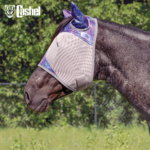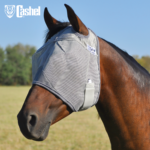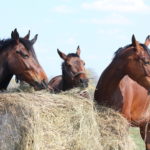Day-to-day management is where chokes are made–or prevented. Here’s how you can keep esophageal blockages from happening to your horses:
- Feed them as nature intended, with near-continual access to roughage and small servings of grain concentrates doled out several times throughout the day. With fiber in their gut throughout the day, they shouldn’t ever feel hungry enough to bolt their feed.
- Provide palatable roughage, free of extremely dry, tough stems or other barely chewable fare, and concentrates that encourage thorough mastication. Prevent access to fine lawn clippings, tree twigs, corn cobs and other ingestibles that may not be fully masticated before swallowing.
- Feed hay and grain from ground or floor-level feeders.
- Slow the intake of habitually greedy eaters by putting fist-sized or larger rocks in the feeders to force them to pick the grain or pellets between the rocks.
- Provide individual stations or stalls for feeding concentrates so group interactions won’t disrupt careful mastication of feed.
- Wet down processed feeds just before feeding to be sure the concentrates will be well moistened for swallowing. Presoak beet pulp until it has reached maximum volume, and wet hay for fatigued horses and others with compromised ability to chew fibrous feeds thoroughly.
- Allow fatigued horses, postsurgical patients, recently ill horses and others who have been on reduced rations only small amounts of soft, fibrous feed (grass is ideal) at one time until they’ve taken the edge off their hunger.
- Schedule regular dental check-ups and maintenance for all horses, but be particularly watchful of growing horses, whose loss of “baby” teeth and molar eruptions can disrupt their ability to chew, and geriatric animals, who can no longer masticate hard and fibrous feeds sufficiently for safe swallowing.





